| Cranks Reading with Questions Worksheet |
|---|
| www.studenthandouts.com ↣ Social Studies ↣ Social Studies Handouts |
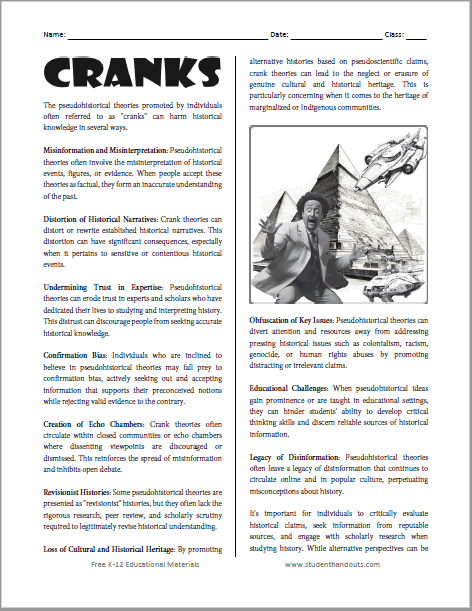 |
 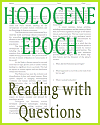 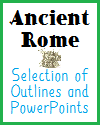 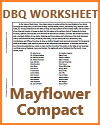 |
|
Click here to print.
Answer key: (1) actively seeking out and accepting information that supports one's preconceived notions while rejecting valid evidence to the contrary; (2) including and believing information that supports one's theories while ignoring or dismissing contradictory evidence; (3) answers will vary. The pseudohistorical theories promoted by individuals often referred to as "cranks" can harm historical knowledge in several ways. Misinformation and Misinterpretation: Pseudohistorical theories often involve the misinterpretation of historical events, figures, or evidence. When people accept these theories as factual, they form an inaccurate understanding of the past. Distortion of Historical Narratives: Crank theories can distort or rewrite established historical narratives. This distortion can have significant consequences, especially when it pertains to sensitive or contentious historical events. Undermining Trust in Expertise: Pseudohistorical theories can erode trust in experts and scholars who have dedicated their lives to studying and interpreting history. This distrust can discourage people from seeking accurate historical knowledge. Confirmation Bias: Individuals who are inclined to believe in pseudohistorical theories may fall prey to confirmation bias, actively seeking out and accepting information that supports their preconceived notions while rejecting valid evidence to the contrary. Creation of Echo Chambers: Crank theories often circulate within closed communities or echo chambers where dissenting viewpoints are discouraged or dismissed. This reinforces the spread of misinformation and inhibits open debate. Revisionist Histories: Some pseudohistorical theories are presented as "revisionist" histories, but they often lack the rigorous research, peer review, and scholarly scrutiny required to legitimately revise historical understanding. Loss of Cultural and Historical Heritage: By promoting alternative histories based on pseudoscientific claims, crank theories can lead to the neglect or erasure of genuine cultural and historical heritage. This is particularly concerning when it comes to the heritage of marginalized or Indigenous communities. Obfuscation of Key Issues: Pseudohistorical theories can divert attention and resources away from addressing pressing historical issues such as colonialism, racism, genocide, or human rights abuses by promoting distracting or irrelevant claims. Educational Challenges: When pseudohistorical ideas gain prominence or are taught in educational settings, they can hinder students' ability to develop critical thinking skills and discern reliable sources of historical information. Legacy of Disinformation: Pseudohistorical theories often leave a legacy of disinformation that continues to circulate online and in popular culture, perpetuating misconceptions about history. It's important for individuals to critically evaluate historical claims, seek information from reputable sources, and engage with scholarly research when studying history. While alternative perspectives can be valuable, they should be grounded in evidence and subject to rigorous scrutiny to contribute to a deeper and more accurate understanding of the past. Shows like Ancient Aliens have faced criticism from scholars and experts for several reasons, and many argue that they undermine legitimate history in the following ways. 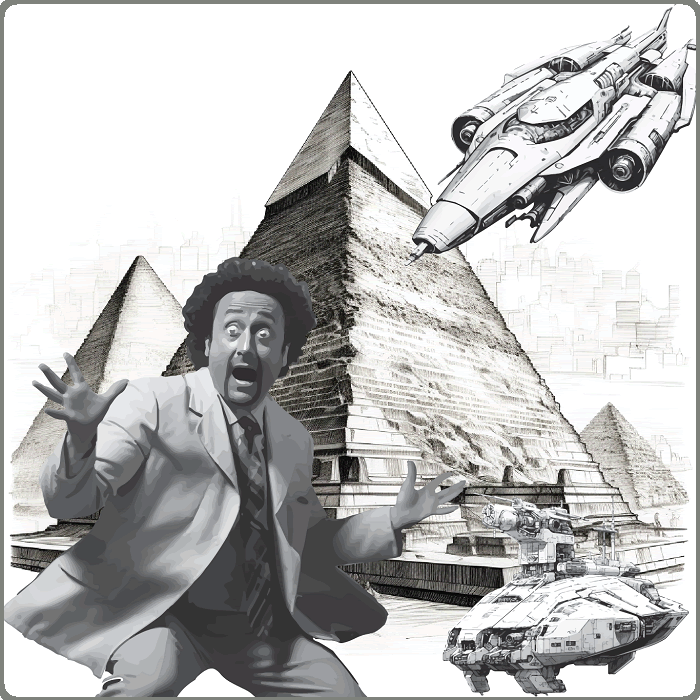 Pseudoscience and Speculation: Ancient Aliens often presents speculative and pseudoscientific claims as if they were established facts. This can mislead viewers and create a false impression of historical events.
Pseudoscience and Speculation: Ancient Aliens often presents speculative and pseudoscientific claims as if they were established facts. This can mislead viewers and create a false impression of historical events.
Misrepresentation of Evidence: The show has been accused of misrepresenting archaeological and historical evidence to fit its narrative. This can distort the true context and significance of artifacts and sites. Cherry-Picking Data: Ancient Aliens tends to cherry-pick information that supports its theories while ignoring or dismissing contradictory evidence. This selective approach can present a biased and inaccurate view of history. Lack of Peer Review: In academia, historical and archaeological research undergoes peer review by experts in the field to ensure accuracy and reliability. Ancient Aliens bypasses this rigorous process, leading to unchecked claims. Sensationalism: The show often relies on sensationalism and dramatic storytelling to capture viewers' attention. While this can be entertaining, it may lead to the prioritization of entertainment value over factual accuracy. Conspiracy Theories: Ancient Aliens frequently promotes conspiracy theories related to hidden knowledge and government cover-ups. These theories can contribute to misinformation and distrust in legitimate historical research. Misleading Expert Appearances: The presence of experts on the show can give the appearance of credibility, but some experts have criticized the show for taking their statements out of context or misrepresenting their views. Distortion of Cultural Heritage: The show's speculative claims can distort the cultural heritage of ancient civilizations and perpetuate stereotypes about the achievements of non-Western cultures. Distrust of Science: By presenting fringe theories as valid alternatives to established scientific explanations, Ancient Aliens can foster a distrust of mainstream science and the scientific method. Lack of Critical Thinking: Encouraging critical thinking is an essential part of historical education. Ancient Aliens often discourages critical examination of its claims, as it presents them as self-evident truths. In summary, while shows like Ancient Aliens may be entertaining for some viewers, they are widely criticized within the academic and scientific communities for promoting pseudoscience, misrepresenting evidence, and undermining legitimate historical research. It's essential for viewers to approach such programs with skepticism and seek out credible sources when exploring historical and archaeological topics. |
| www.studenthandouts.com ↣ Social Studies ↣ Social Studies Handouts |














































